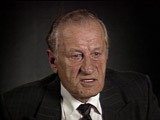You searched for: ���������������������������������������������fuk7778���your
<< Previous | Displaying results 121-130 of 163 for "���������������������������������������������fuk7778���your" | Next >>
-
Tattoos and Numbers: The System of Identifying Prisoners at Auschwitz
ArticleLearn more about how the Nazis identified and tattooed prisoners at the Auschwitz concentration camp complex.
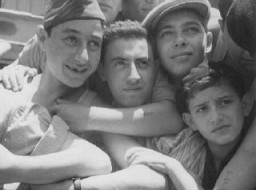
-
Jewish Refugees Aboard the SS Quanza
ArticleThe SS Quanza was a Portuguese ship chartered by 317 Jewish refugees attempting to escape Nazi-dominated Europe in August 1940. Learn about its journey.
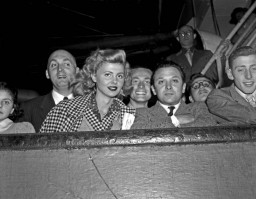
-
Felix Horn describes escaping from the Majdan Tatarski ghetto and seeking shelter
Oral HistoryFelix was born to an assimilated Jewish family in Lublin, Poland. His father was a locksmith and his mother was a singer. Following the German invasion of Poland on September 1, 1939, Felix fled east to Rovno and then to Soviet-occupied Lvov, where he was accepted at a medical school. After the German invasion of the Soviet Union in June 1941, Felix was taken to a labor camp. He escaped and returned to Lublin, and found that his family had been forced into the ghetto established there. After the…
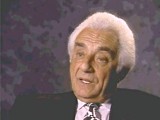
-
Life After the Holocaust: Regina Gelb
ArticleAfter WWII and the fall of the Nazi regime, Holocaust survivors faced the daunting task of rebuilding their lives. Listen to Regina Gelb's story.
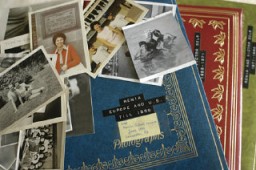
-
David Stoliar describes being the only witness to the fate of the "Struma"
Oral HistoryIn 1936, David moved to Bucharest to live with his father. As Romania came under German influence, Romanian authorities introduced increasingly harsh measures against Jews. Antisemitic agitation increased and Jews came under attack in the streets of Bucharest and in other public places. David's father decided David should leave the country and arranged passage for him to Palestine. In December 1941, David left Romania from Constanta, a port city on the Black Sea, on the "Struma," an old cattle boat. The…

-
Miriam Farcus Ingber describes witnessing a suicide attempt in the Stutthof camp
Oral HistoryMiriam was one of ten children born to a poor, religious Jewish family in Terava, Czechoslovakia. When Hungary took over the area in 1939, almost half the town's Jewish population was deported and sent to labor camps. Later, Miriam and her mother were forced into a ghetto. They were deported to the Auschwitz camp in 1944. After about three months, they were sent to the Stutthof camp. Toward the end of the war, Miriam and her mother were forced on a death march. They and others on the death march were…
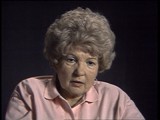
-
Madeline Deutsch describes ghettoization in Hungary
Oral HistoryMadeline was born into a middle class family in an area of Czechoslovakia that was annexed by Hungary in 1938-1939. Her father worked out of their home and her mother was a homemaker. Madeline attended high school. In April 1944 her family was forced into a Hungarian ghetto. The family lived in the ghetto for two weeks before being transported to Auschwitz. Madeline and her mother were separated from her father and older brother. Neither her father nor brother survived the war. A week after arriving in…
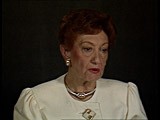
-
Barbara Marton Farkas describes deportation from Hungary to Auschwitz
Oral HistoryBarbara was born in the province of Arad in northern Transylvania, Romania. She went to school until the Hungarian army occupied the area in 1940 and she was no longer allowed to attend. After the Germans occupied Hungary in 1944, discrimination against Jews intensified. Barbara and her family were forced into the Oradea ghetto. She worked in the ghetto hospital until she was deported to the Auschwitz camp. At Auschwitz, she worked in the kitchens to receive extra food. She was deported to another camp,…
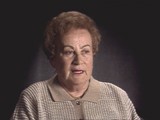
-
Sam Itzkowitz describes forced labor in the gravel pits of Auschwitz
Oral HistoryThe Germans invaded Poland in September 1939. When Makow was occupied, Sam fled to Soviet territory. He returned to Makow for provisions, but was forced to remain in the ghetto. In 1942, he was deported to Auschwitz. As the Soviet army advanced in 1944, Sam and other prisoners were sent to camps in Germany. The inmates were put on a death march early in 1945. American forces liberated Sam after he escaped during a bombing raid.
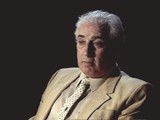
-
Julian Noga describes conditions in Flossenbürg
Oral HistoryJulian's Catholic parents had settled in the United States, but his mother returned to Poland. In 1939, Julian was deported to Austria to do farm labor after he was caught for hiding a rifle. On the farm he met the landowner's daughter, Frieda, his future wife. He was arrested in 1941 because relationships between Austrians and Poles were considered illegal and in 1942 he was deported to the Flossenbürg camp in Germany. During a forced march in 1945, he was liberated by US forces. Julian and Freida…
